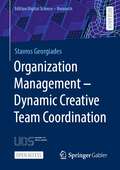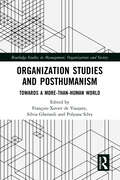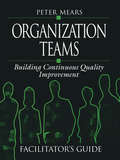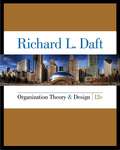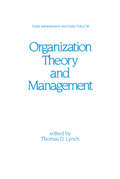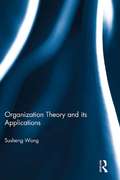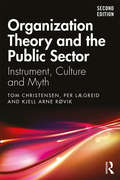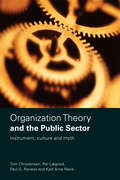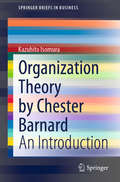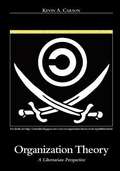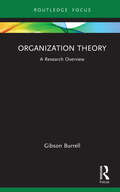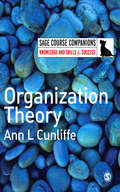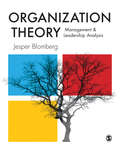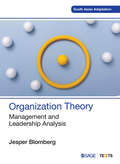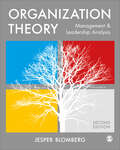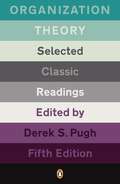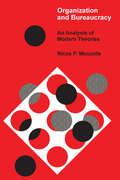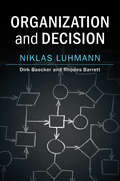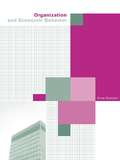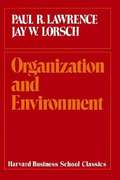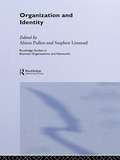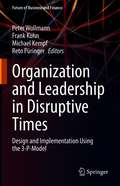- Table View
- List View
Organization Management – Dynamic Creative Team Coordination (Edition Digital Science)
by Stavros GeorgiadesThis open access book, through an in-depth process study of the interactions of two creative groups (film production crew) in temporary organizations during two media projects, explores how a team developmental process unfolds and proposes a model illustrating how the groups repeatedly change formation so that individuals can manage job interdependencies and new issues arising while developing, building up, and synthesizing new ideas into a final creative solution. This theory on creative group dynamic coordination builds theory on how and why creative groups coordinate, challenges assumptions about the role of formal structures and informal practices by demonstrating how the two dynamically interact and complement each other to facilitate coordination via the emergence of what one would expect to be “un-coordinated methods”, and provides an alternative perspective to the stages the groups have to go through by emphasizing a cyclical and not a linear team developmental process.
Organization Results: Creating Capabilities
by Dave Ulrich Norm Smallwood Jack ZengerLeaders can and should deliver organization results and help others develop the skills they need to make that happen. This chapter addresses the questions: Do I have the right organization? and What can I do to ensure my organization has the capabilities required to achieve results?
Organization Studies and Posthumanism: Towards a More-than-Human World (Routledge Studies in Management, Organizations and Society)
by Silvia Gherardi de Vaujany, François-Xavier Polyana SilvaThis book aims at exploring the reception of critical posthumanist conversations in the context of Management and Organization Studies. It constitutes an invitation to de-center the human subject and thus an invitation to the ongoing deconstruction of humanism. The project is not to deny humans but to position them in relation to other nonhumans, more-than-humans, the non-living world, and all the “missing masses” from organizational inquiry. What is under critique is humanism’s anthropocentrism, essentialism, exceptionalism, and speciesism in the context of the Anthropocene and the contemporary crisis the world experiences. From climate change to the loss of sense at work, to the new geopolitical crisis, to the unknown effects of the diffusion of AI, all these powerful forces have implications for organizations and organizing. A re-imagination of concepts, theories, and methods is needed in organization studies to cope with the challenge of a more-than-human world.
Organization Teams: Building Continuous Quality Improvement Facilitator's Guide
by Peter MearsThe facilitator's guide is a companion to Organization Teams: Building a Continuous Quality Improvement. This guide provides lesson plans, including suggested time allocation, masters that can be used to create your own transparencies, quality bucks photocopy masters, a method for randomly assigning participants to teams, a "little instructor" who will offer suggstions and share ideas.
Organization Theory And Design
by Richard L. DaftDiscover the most progressive thinking about organizations today as acclaimed author Richard Daft balances recent, innovative ideas with proven classic theories and effective business practices. Daft's best-selling ORGANIZATION THEORY AND DESIGN presents a captivating, compelling snapshot of contemporary organizations and the concepts driving their success that will immediately engage any reader. Recognized as one of the most systematic, well-organized texts in the market, ORGANIZATION THEORY AND DESIGN helps both future and current managers thoroughly prepare for the challenges of today's business world. This revision showcases some of today's most current examples and research alongside time-tested principles. Readers see how many of today's well-known organizations thrive amidst a rapidly changing, highly competitive international environment. New learning features provide opportunities for readers to apply concepts and refine personal business skills and insights.
Organization Theory and Management: The Philosophical Approach, Second Edition (Public Administration And Public Policy Ser. #116)
by Thomas D. LynchThis book reviews the evolution of organization theory literature and explains other theories of organization and the implicit wisdom of the instructor's favorite theory. It helps the reader to understand the relevance of organization theory to the problems of administering public organizations.
Organization Theory and its Applications
by Susheng WangOrganization theory is a fast developing field of microeconomics. Organizational approaches are now used in a wide range of topics in business studies. They are based on information economics, contract theory and mechanism design. This book introduces such organizational approaches and how to adopt them as business applications. The book presents the theory in the first two chapters and proceeds to cover the applications of the theory in the later three chapters. The theory lays the foundation and the applications illustrate how the theory can be used in a wide range of business problems. The book covers many concepts and ideas in organization theory, including complete contracts, incomplete contracts, allocation of control rights, option contracts, convertibles, and joint ventures concisely. It will be of use to third year undergraduates and above, Master’s and Ph.D levels for students in business schools.
Organization Theory and the Public Sector: Instrument, Culture and Myth
by Tom Christensen Per Lægreid Kjell Arne RovikPublic-sector organizations are fundamentally different from their private-sector counterparts. They are part of the society’s political organizations and are major political actors. They are multifunctional, follow a political leadership, and the majority do not operate in an external market. In an era of rapid reform, reorganization and modernization of the public sector, this book offers a timely and illuminating introduction to the public-sector organization that recognizes its unique values, interests, knowledge and power base. Drawing on both instrumental and institutional perspectives within organization theory, as well as democratic theory and empirical studies of decision-making, the book addresses five central aspects of the public-sector organization: ■ goals, values and motivation ■ leadership and steering ■ reform and change ■ effects. learning and implications ■ understanding and design The book challenges conventional economic analysis of the public sector, arguing instead for a political-democratic approach and a new prescriptive organization theory. A rich resource of both theory and practice, Organization Theory and the Public Sector: Instrument, culture and myth is essential reading for anybody studying the public sector. This second edition of the book contains a range of new and updated themes, examples and references.
Organization Theory and the Public Sector: Instrument, Culture and Myth
by Tom Christensen Per Lægreid Paul G. Roness Kjell Arne RøvikPublic sector organizations are fundamentally different to their private sector counterparts. They are multi-functional, follow a political leadership, and the majority do not operate in an external market. In an era of rapid reform, reorganization and modernization of the public sector, this book offers a timely and illuminating introduction to the public sector organization that recognizes its unique values, interests, knowledge and power-base. Drawing on both instrumental and institutional perspectives within organization theory, as well as democratic theory and empirical studies of decision-making, this text addresses five central aspects of the public sector organization: goals and values leadership and steering reform and change effects and implications understanding and design. This volume challenges conventional economic analysis of the public sector, arguing instead for a democratic-political approach and a new, prescriptive organization theory. A rich resource of both theory and practice, Organization Theory for the Public Sector: Instrument, Culture and Myth is essential reading for anybody studying the public sector.
Organization Theory by Chester Barnard: An Introduction (SpringerBriefs in Business)
by Kazuhito IsomuraThis book helps undergraduate and graduate students understand Chester Barnard’s organization theory. Barnard’s book The Functions of the Executive is a classic that, along with Herbert Simon’s Administrative Behavior, is often considered to be essential reading for management students. However, it is well known to be difficult and abstract. Offering a systematic overview, this book provides an excellent introduction to Barnard’s organization theory.Chester Barnard’s concept of formal organization is often cited as a definitive opus on the subject of organization. However, he provided other concepts of organization, such as cooperative systems, complex formal organizations, and informal organizations. In his second book, Organization and Management, he added two more concepts, lateral organizations and status systems, allowing researchers to gain a better understanding of how Barnard developed his organization theory after his first publication.Barnard was a successful practitioner as well as a theorist, and his organization theory is full of practical insights gained from managing various types of organizations, including NGOs and NPOs. This book discusses how Barnard’s organization theory can be applied to business practices in the context of exploring a new style of management, and provides suggestions for business people seeking innovations for their own organizations.
Organization Theory: A Libertarian Perspective
by Kevin A. CarsonThis book applies the economic principles of individualist anarchism, as developed in Studies in Mutualist Political Economy, to the study of the large organization. It integrates the insights of mainstream organization theory into that framework, along with those of more radical thinkers like Ivan Illich, Paul Goodman, and R.A. Wilson.
Organization Theory: A Research Overview (State of the Art in Business Research)
by Gibson BurrellThis shortform book presents an overview of theoretical and empirical work in the field of organization theory. In doing so, it both provides a critical analysis of the state of knowledge in the field and offers recommendations for future directions. It is about both thinking differently, and considering what is already known within Organization Theory. With coverage of the foundations of organisation studies, the importance of bureaucracy, and insights into institutional approaches, the book also makes space to consider the key role of alternatives in the development of the field. A panoply of modes of organizing the modern economy and civil society have arisen wherein it is often said that the platform has replaced the pyramid. Yet, in 2022, the pandemic underscores the state’s responsibility to maintain public health through centralized and coherent organization rather than outsourcing, subcontracting and the gig economy. The book offers a new direction for research focusing upon ‘organizational camouflage’, where the unmasking of the large hierarchical corporation’s enduring role in governing our everyday lives would become Organization Theory’s revelatory task. Organization Theory: A Research Overview will be of value to researchers, scholars and students in the fields of business and management, especially those interested in the intersection of politics and organizations.
Organization Theory: Images Of Organization/ Organization Theory/ A Very Short Fairly Interesting And Reasonably Cheap Book About Studying Organizations (SAGE Course Companions series)
by Ann L CunliffeThe SAGE Course Companion on Organization Theory is an accessible introduction to a challenging subject area. This book helps readers to extend their understanding of theories and make the connection between them and organizational practice. It will enhance their thinking skills in line with course requirements and provides support on how to revise for exams and prepare for and write assessed pieces. Readers are encouraged not only to think like a organizational theorist but also to think about the subject critically. Designed to compliment existing textbooks for the course, the companion provides: - Easy access to the key themes in Organizational Theory - Helpful summaries of the approaches taken by the main course textbooks - Sample questions and answers, with common themes that must always be addressed - Short vignettes and a case study that runs throughout the chapters - Guidance on the essential study skills required to pass the course - `Taking It Further' sections that suggest how readers can extend their thinking beyond the `received wisdom' The SAGE Course Companion in Organizational Theory is much more than a revision guide for undergraduates; it is an essential tool that will help readers take their course understanding to new levels and help them achieve success in their undergraduate course. Instructor resources are available for this title. Please click here to contact your Sales Representative for more information.
Organization Theory: Management and Leadership Analysis
by Jesper BlombergIn Organization Theory: Management and Leadership Analysis, Jesper Blomberg explores the fields of organization theory and management, making sense of complex theories and encouraging critical thinking. The book analyses organizations through four theoretical frameworks, offering students a clear structure they can use to understand complex organizational issues: · the structural framework · the Human Resources framework · the power framework · the symbolic framework Each framework is explored by a chapter covering the basics, followed by a more advanced chapter so that students can deepen their understanding. A case study at the end of the book draws together theory and practice, giving students the opportunity to apply what they have learnt to a real management situation. This book is suitable for undergraduate and postgraduate students studying Organization Theory and Management. The book is complemented by a range of online resources including PowerPoint slides, an Instructor&’s Manual and Testbank.
Organization Theory: Management and Leadership Analysis
by Jesper BlombergIn Organization Theory: Management and Leadership Analysis, Jesper Blomberg explores the fields of organization theory and management, making sense of complex theories and encouraging critical thinking. The book analyses organizations through four theoretical frameworks, offering students a clear structure they can use to understand complex organizational issues: · the structural framework · the Human Resources framework · the power framework · the symbolic framework Each framework is explored by a chapter covering the basics, followed by a more advanced chapter so that students can deepen their understanding. A case study at the end of the book draws together theory and practice, giving students the opportunity to apply what they have learnt to a real management situation. This book is suitable for undergraduate and postgraduate students studying Organization Theory and Management. The book is complemented by a range of online resources including PowerPoint slides, an Instructor&’s Manual and Testbank.
Organization Theory: Management and Leadership Analysis
by Jesper BlombergIn Organization Theory: Management and Leadership Analysis, Jesper Blomberg explores the fields of organization theory and management, making sense of complex theories and encouraging critical thinking. The book analyses organizations through four theoretical frameworks, offering students a clear structure they can use to understand complex organizational issues: the structural framework the Human Resources framework the power framework the symbolic framework Each framework is explored by a chapter covering the basics, followed by a more advanced chapter so that students can deepen their understanding. A case study at the end of the book draws together theory and practice, giving students the opportunity to apply what they have learnt to a real management situation. This book is suitable for undergraduate and postgraduate students studying Organization Theory and Management. The book is complemented by a range of online resources including PowerPoint slides, an Instructor's Manual and Testbank.
Organization Theory: Management and Leadership Analysis
by Jesper BlombergIn Organization Theory: Management and Leadership Analysis, Jesper Blomberg explores the fields of organization theory and management, making sense of complex theories and encouraging critical thinking. The book analyses organizations through four theoretical frameworks, offering students a clear structure they can use to understand complex organizational issues: · the structural framework · the Human Resources framework · the power framework · the symbolic framework Each framework is explored by a chapter covering the basics, followed by a more advanced chapter so that students can deepen their understanding. A case study at the end of the book draws together theory and practice, giving students the opportunity to apply what they have learnt to a real management situation. This book is suitable for undergraduate and postgraduate students studying Organization Theory and Management. The book is complemented by a range of online resources including PowerPoint slides, an Instructor’s Manual and Testbank. Jesper Blomberg is Associate Professor at the Stockholm School of Economics, Sweden.
Organization Theory: Management and Leadership Analysis
by Jesper BlombergIn Organization Theory: Management and Leadership Analysis, Jesper Blomberg explores the fields of organization theory and management, making sense of complex theories and encouraging critical thinking. The book analyses organizations through four theoretical frameworks, offering students a clear structure they can use to understand complex organizational issues: · the structural framework · the Human Resources framework · the power framework · the symbolic framework Each framework is explored by a chapter covering the basics, followed by a more advanced chapter so that students can deepen their understanding. A case study at the end of the book draws together theory and practice, giving students the opportunity to apply what they have learnt to a real management situation. This book is suitable for undergraduate and postgraduate students studying Organization Theory and Management. The book is complemented by a range of online resources including PowerPoint slides, an Instructor’s Manual and Testbank. Jesper Blomberg is Associate Professor at the Stockholm School of Economics, Sweden.
Organization Theory: Selected Classic Readings
by Derek S. PughThis book spans seventy years of theory from Max Weber's seminal writings on bureaucratic organization to the latest management thinking represented by Handy, Peters and Waterman. Covering three main areas of interest, those of the structure of organizations, management and decision making, as well as that of organizational behaviour, this thoroughly revised and updated edition contains a vast amount of new contributions. It is a widely acknowledged text in its field, and an essential handbook for all those it concerns. It has also been announced as a core text for Open University courses from January 2008.
Organization and Bureaucracy: An Analysis of Modern Theories
by T.A.J. NicholsonThe American Journal of Sociology says of this book "Mouzelis knows and handles the literature well and accurately brings the reader up to the early sixties. A summarizer, synthesizer, and historian of modern theories, he serves his novice well. The more initiated student of formal organizations will appreciate the critiques of his favorite theorists: Mouzelis cuts clean and bold. Along with order, he does add critical insight to his borrowed materials."This book is a carefully integrated and very straightforward guide to the labyrinth of theory on organizational phenomena, and surveys the most important approaches to the study of organizations and the manner in which these approaches are interrelated. The author's interest is in showing the successive stages of theory generation and development in the two major traditions of thought on this subject, thereby providing a coherent overview of the field, a method for systematically investigating it, and an unusually broadening supplement to the standard treatment of organizations in undergraduate and graduate courses.The author discusses the writings of such theorists as Marx, Weber, and Michels who, from a very wide perspective, tried to assess the impact of large-scale bureaucracy on the power structure of modern society. He also examines the other tradition of organizational writings that starts with Taylor and the movement of scientific management. Finally, an analysis is made of recent theoretical trends that indicate a certain convergence of the bureaucracy and the managerial lines of thought.In emphasizing the conceptual frameworks that underlie organization theory and in showing the dynamics of theory progression, the author provides students with invaluable assistance in understanding the levels of theoretical analysis, the variables to be taken into consideration, and the manner in which these variables may be accounted for in a systematic manner.
Organization and Decision
by Dirk Baecker NIklas Luhmann Rhodes BarrettTranslated into English for the first time, Luhmann's modern classic, Organization and Decision, explores how organizations work; how they should be designed, steered, and controlled; and how they order and structure society. Luhmann argues that organization is order, yet indeterminate. In this book, he shows how this paradox enables organizations to embed themselves within society without losing autonomy. In developing his autopoietic perspective on organizations, Luhmann applies his general theory of social systems by conceptualizing organizations as selfreproducing systems of decision communications. His innovative and interdisciplinary approach to the material (spanning organization studies, management and sociology) is integral to any study of organizations. This new translation, edited by one of the world's leading experts on Luhmann, enables researchers and graduate students across the English-speaking world to access Luhmann's ideas more readily.
Organization and Economic Behaviour
by Anna GrandoriOrganization and Economic Behaviour presents all the basic elements of organizational theory and behaviour. Different approaches are analysed, with a strong focus on reintegrating sociological, psychological and economic contributions to the subject.This unique volume is clearly written and is designed to address a wide audience, including students
Organization and Environment: Managing Differentiation and Integration (Harvard Business School Press Classics Ser. #Vol. 1)
by Jay W. Lorsch Paul R. LawrenceAnalyzes the connection between a company's outside influences (technological, market, and economic) and its pattern of organization and administration. A Harvard Business School Classics Edition.
Organization and Identity: Concepts And Methods (Routledge Studies in Business Organizations and Networks)
by Stephen Linstead Alison PullenExploring identity as a contemporary concern in everyday life and in the social sciences, this book focuses on how ideas about identity can be applied to organization and management studies. The contributors, all respected authorities in the field, use and develop recent philosophical thought on the nature of identity, and question the key social divisions of gender, class and nation. Bringing approaches from contemporary philosophy into the area of organization theory, this book critically assesses their relevance and impact in a way which interrupts identity as a notion.
Organization and Leadership in Disruptive Times: Design and Implementation Using the 3-P-Model (Future of Business and Finance)
by Peter Wollmann Frank Kühn Michael Kempf Reto PüringerThis book follows on the authors’ successful development of the Three-Pillar Model (3-P Model) for organizing and leading in disruptive times. Its focus is on helping the reader to implement the model and providing a wide variety of application cases for these VUCA times (Volatility, Uncertainty, Complexity and Ambiguity), including global crises like the COVID-19 pandemic. The book covers a broad range of organizations: private and public sector, NGOs, local and global governmental institutions, global organizations such as UN, etc. In addition, it shows how the 3-P Model can be applied to challenges in organization design, management and leadership.
